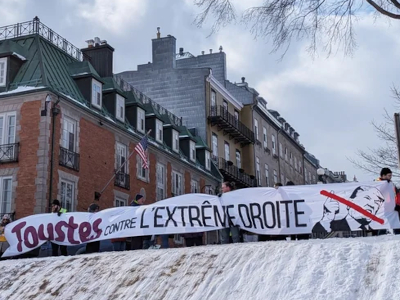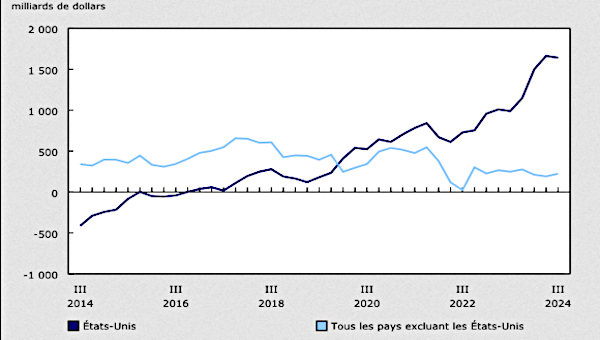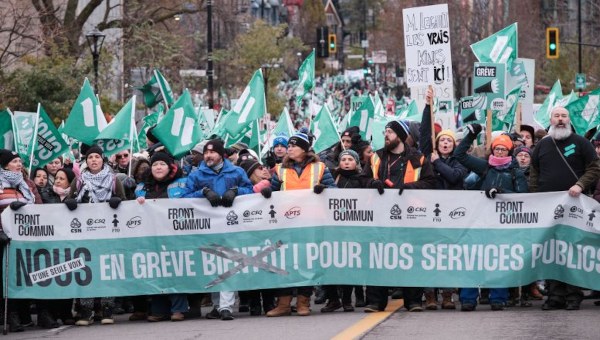A Pro-Climate Society of Care and Connection Against Trump’s Blackmail
As noted in my previous article, Canada and Quebec’s commercial entanglement in the US economy is profound following thirty years of “free trade,” with neoliberal capitalism as its legacy. Suddenly, Trump has thrown this aside for an attempt to neo-fascistize the US and the world. The result is an abrupt return to the old annexationist imperialism of yesteryear now that the US no longer has the means to be the world’s policeman. From their North American stronghold, the US seeks to build an improbable neofascist alliance with Russia at the expense of a cast-off Europe, beginning with Ukraine, to isolate China.
The door is thus open to a tariff war that could lead to Canada’s annexationist capitulation if carried through to the end and quickly. As for Canada’s superficial patriotic resistance, it has its limits, especially in Quebec but also in the face of strong regionalism in the West. It is more the economic cost for certain US business people, and also for the US people in proportion to their mobilisation, that can slow Trump down. But more experienced and prepared than in 2016 and facing less institutional and popular resistance than then, Trump seems to want to ignore for now the signal of plummeting stock market indices. We shall see what happens next. As for Quebec and Canada, it is up to them to free themselves from the Moloch’s grip through a society of care and connection.
From Unemployment Insurance to Maple Syrup via Oil and Electricity
The first line of popular defence, in the short term, lies in an enhanced unemployment insurance programme, known as employment insurance, as promised by the Trudeau government since its first term – a promise never kept. Let us remember that “trade union organisations have already pointed out that only 40% of the unemployed qualify for benefits.” Social welfare will not sustain a man, much less a woman. Meanwhile, affected businesses, especially manufacturing ones – almost all are or will be affected directly or indirectly, if only in relation to a stunted market – may frantically seek new customers, but the whole world will be in stagnation or recession or at least in decline. All countries through their trade, investments, and funding are linked as never before by the global market. For Quebec businesses, there is the added obstacle of great distance even from other provinces, notwithstanding the strengthened deregulation of the mobility of products, services, and labour between provinces. The proximity of Ontario (and the relative importance of its population) generates 60% of Quebec’s interprovincial trade compared to only 10% for British Columbia.
Quebec’s imports from the US are heavily weighted by the road transport sector, accounting for more than 40% in cars, trucks, tires, petroleum products, barely offset by the export of some trucks and not counting the import of Albertan oil and gas. Among the rest of the imports, we must count a range of food products, including out-of-season fruits and vegetables, and machinery (all statistics in this article come from the publication “Quebec’s External Trade,” The Notepad, Winter 2025 Edition). On the other hand, Quebec’s exports to the US are more diversified, although electricity, raw or in the form of raw aluminium, accounts for about 12% and will be more important in the future with the implementation of firm export contracts for raw electricity to New York and New England. The aircraft sector also contributes to a 12% level but is half offset by imports from the same sector. For the rest, Quebec exports many semi-processed or processed natural resources or low-technology products derived from forests (construction timber, paper, pulp), its subsoil (copper, gold), and its soil (soya, pork… maple syrup).
The Elephant in the Room, the Great Media Oversight, the Immense Flight of Capital
Note that while Quebec exports outside Quebec the equivalent of 47% of its GDP, of which just over 20% goes to the US, the contribution of these exports to the economy only accounts for 30% given the import of components. This is particularly true for aircraft but also for aluminium (bauxite). This means that the economic contribution of more or less processed natural resources is relatively more important than it appears. While the mainstream media focus on trade with the US, we must not forget the balance (the cumulative stock as distinct from annual flows) of international investments available only for Canada:
Canada’s Net International Investment Balance, by Region [statcan]
Whilst this net balance (assets minus liabilities) was negative in 2015, it has become very positive since then, amounting to no less than 1,640 billion dollars at the end of 2024, equivalent to nearly 2.5 years of Canada’s gross capital formation. One can only observe a gigantic flight of Canadian capital to the US. Canada is (re)becoming a hewer of wood and drawer of water. However, Quebec was (and probably remains) less so than the rest of Canada, contrary to popular prejudices, as François Moreau demonstrated in his 1988 book Quebec’s External Trade. This reality is leading Trump to use tariffs to recover what remains of sophisticated manufacturing (vehicles, aircraft). But why on earth steel and aluminium, which perhaps punishes US companies and their workers more… unless the unspoken goal is for Canada to become, in whole or in pieces, the 51st state?
Based on this state of affairs, what can be done to fight the “economic” annexationist assault of the fascist US presidency with a view to the urgent building of a pro-climate society of care and connection based on a solidarity-driven material degrowth as developed in my last article? The first major task is certainly to stop dead and repatriate this monstrous haemorrhage of capital serving US imperialism, whose true colours Trumpism reveals, particularly in Palestine and Ukraine.
Should we add that this crucial task will require not only bringing the financial sector into line but also controlling international capital flows, which also means interprovincial flows within the framework of the “New Quebec” Solidaire. This “New Quebec” could then not only gain the support of the English Canadian people but also lead them. The working people will not get through this without socialisation, that is to say, the nationalisation – democratisation – of banks and other financial institutions in order to recycle national savings, the fruit of popular labour but usurped by big capital, toward the construction of this society of connection and care.
The anti-Trump keystone of trade with the US is to ban the solo car
The commercial dependence on the US commands as a key task in this area to ban the combination of (SUV)-solo cars and hydrocarbons by eliminating each of the two terms. This anti-Trump rejection has the additional virtue of cutting short the new extractivism of green capitalism, of which the electric solo car is a pillar. We inevitably end up with an electrified public transport system taking possession of the road network. The result is to dispense with costly underground systems and aerial trains requiring many imported elements. This public transport is combined with active transport within the framework of the proximity of urban functions scattered with green spaces. Should we recall that Quebec has factories capable of manufacturing public transport vehicles potentially of superior quality to those manufactured in India for the REM.
The electricity required for transport at the expense of hydrocarbons in no way justifies an orgy of new hydroelectric power stations and new wind farms, many components of which must be imported. The alternative is the recycling of electricity from renovated or eco-energy-built buildings with supplementary solar panels for (quasi)-zero energy consumption. This eco-energy renovation – most of the construction materials are or can be manufactured in Quebec or Canada – simultaneously eliminates the hydrocarbons necessary for air conditioning of both residential buildings not heated by electricity and institutional and industrial ones.

Liberation from the burden of importing hydrocarbons and private vehicles gives Quebec’s trade balance room to absorb a substantial drop in exports to the US due to Trumpian tariffs. There is also no need to go into debt vis-à-vis international financial capital to finance a balance of payments deficit. Exports from the aircraft sector (and armaments), especially Bombardier’s private jets, are well worth sacrificing to reduce greenhouse gases and militarism.
Employees of these factories will be able to retrain in the manufacture of collective transport vehicles without too many problems. Employees of refineries and even pulp and paper mills – sacrificing standing timber for paper, especially newsprint, is the height of energy-intensive pollution – will be advantageously recycled toward building renovation, the manufacture of construction materials, and reforestation. These lost exports to the US, especially those from natural resources that can be further processed, can be the subject of exchange with the rest of Canada, Mexico, and Europe, even if it means arranging trade agreements with them in a spirit of equal exchange.
Non-Meat Food Liberates Agriculture from Both GHGs and Trump
Quebec’s interprovincial trade in products and services is roughly balanced despite a significant importation of Albertan oil. There is a consequent exchange of food products and subsoil and computer services. However, beware of energy-intensive server farms, products imported from the US, especially for artificial intelligence boosted with hormones by GAFAM disinformation.
A substantial reduction in meat-based food, the other pillar of GHG reduction along with hydrocarbons, would favour drastic reforestation absorbing carbon dioxide – 80% of cultivated areas are used for animal feed. This reduction would also minimise both interprovincial and international trade in food products and maximise their short supply circuits. Even if it is not vis-à-vis the US, food production poses the challenge of temporary workers coming mainly from Mexico and Guatemala. A fair solution, through their unionisation, calls for a combination of their permanent citizenship and youth participation in agricultural work, especially market gardening, including in a school setting.
Anti-Trump Tasks Unachievable When End of the Month Conflicts With End of the World
It will be understood that all these tasks are incompatible with an economy whose raison d’être is maximising business profitability. Its expected consequence, so-called prosperity, is growth, the alpha and omega of government policies. In this context, public services are burdens to be austeritised and carved up in order to privatise them and thus recover them into the capitalist sphere. To drive the point home further, this recovery is done at the expense of taxation (PPP, subcontracting) in order to eliminate risk, which transforms profit into rent.
These privatised services, except for the rich, will thus always be either stripped to the bone or non-existent in proportion to popular resistance. On the flip side, capitalist accumulation, an inevitable consequence of the rivalry between capitals imposing profit maximisation, develops the private market for mass consumption. Its two mammaries are private housing, the most materially prolific form of which is the individual house, and the solo car/SUV, both abundantly financed by banks. Thus, the working people find themselves prisoners of debt. The end of the month becomes an obstacle to the fight against the end of the world.
A society of care and connection whose foundation is material degrowth is at the antipodes of neoliberal capitalism on the path to fascistization. This capitalism becomes incapable of maintaining the growth necessary to maintain the average profit of rival capitals that accumulate. The majority of the working people in Northern countries need, above all, public services that are not conducive to productivity gains and generate strong resistance to their privatisation. The working majority in Southern countries is too poor to profitably bog down in mass consumption, which would accelerate the mad race toward a hothouse Earth.
The Secret of the Anti-Trump and Anti-GHG Struggle is the Mobilisation of the Public Sector
The anti-capitalist rupture is necessary. The dictatorship of Money, under an increasingly thin and transparent formal democratic veneer, must give way to democratic planning, failing which it will yield to neofascism. All the more so as green capitalism hinders the reproduction of the working people with super-austerity cuts in a vain attempt to restore the metabolism of nature with geoengineering. From the trade union and citizen defence of public services and nature (Stablex, Northvolt, Ray-Mont Logistique) emerges a grassroots democracy with a view to an ecological society. Add to this the growth of chronically underfunded popular community services. The multiplication of agricultural initiatives, including community gardens and market gardening SMEs, are the economic premises of this new ecological society. These grassroots initiatives, however, call for coordination at the top in a spirit of solidarity and requiring mastery of national savings. Democratic planning should be a major point in the Quebec Solidaire program, something which remains far too marginal in political thinking.
Environmentalists would do well to be present at the inevitable next mobilisation of public service workers. The 2023-24 strike, despite its significant failings, was one of the most important in Canada and the US during those years. This strike was at the confluence of trade union, feminist, and ecological struggles. But few were aware of this, especially regarding the ecological dimension. The more evident the ecofeminist character of public sector strikes becomes, the more determined and profound the combative will of the strikers will be, and the broader the popular solidarity. It is, moreover, to prevent this danger that the CAQ, in the Trumpist wake, is attempting, in the federal manner, to practically demolish the right to strike with Bill 89. The great rendezvous will be, hopefully, sooner than we think. This will be possible as long as the working people do not remain stunned by fear of Trumpism and paralysed by the false solution of the tariff war and, as far as GHGs are concerned, by the false solutions of electric private vehicles and the battery sector. •
This article first published in English on the Europe-Solidaire website, and at the Presse-toi à gauche! website in French.






